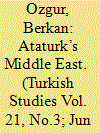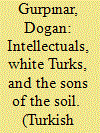|
|
|
Sort Order |
|
|
|
Items / Page
|
|
|
|
|
|
|
| Srl | Item |
| 1 |
ID:
172114


|
|
|
|
|
| Summary/Abstract |
The main argument of this paper is that Turkey had close relations with Middle Eastern states during the Atatürk period, which is contrary to the literature that claims the opposite because of Turkey’s Western-oriented ideology. The article asks why Turkey as a Western-oriented state sought to have close relations with Middle Eastern states. To answer this question, the article uses discourse analysis focusing on Middle Eastern leaders’ visits as represented in Turkish public discourse. Accordingly, it proposes two main answers. Firstly, the paper argues that the new state’s relations with Middle Eastern countries played an important role in legitimation of its Westernization projects in the eyes of its citizens. Secondly, the Turkish state marginalized rival political discourses, mainly Islamism, by proving that even Muslim majority countries wanted to imitate modern Turkey.
|
|
|
|
|
|
|
|
|
|
|
|
|
|
|
|
| 2 |
ID:
172115


|
|
|
|
|
| Summary/Abstract |
The European Union (EU)-Turkey customs union (CU) has led to a significant level of integration between a non-member country and the EU and therefore represents an example of external differentiated integration. Turkey’s relations with the EU, until recently, have been largely motivated by its membership objective. However, Turkey’s membership prospects have recently been diminishing, due both to mutual estrangement because of Turkey’s ever-deteriorating performance on EU-mandated reforms and the current difficulties challenging European integration. Under these circumstances, concerns regarding structural problems and conjunctural challenges have forced both parties to revise the CU. This study aims to explain how the parties should revise it to tackle the challenges posed by current economic relations. It argues that building broader and deeper economic integration with a certain degree of collective policy-making capacity will be crucial for furthering relations, which may thereby contribute to Turkey’s accession process in a longer term.
|
|
|
|
|
|
|
|
|
|
|
|
|
|
|
|
| 3 |
ID:
172111


|
|
|
|
|
| Summary/Abstract |
The article is made up of two distinct parts. The first part surveys the discourses and tropes of intellectuality of the Turkish old-right. The second part specifically discusses the crisis of the conservative intelligentsia as the Islamist takeover of Turkish government in 2002 did not result in conservative intellectuals dominating the intellectual realm. Continuing to remain marginalized and their promises unfulfilled, they have refurbished the old right’s tropes of intellectualism and reiterate the tropes of usurpation of the intellectual realm, while claiming to represent the genuine intelligentsia of the organic nation.
|
|
|
|
|
|
|
|
|
|
|
|
|
|
|
|
| 4 |
ID:
172112


|
|
|
|
|
| Summary/Abstract |
Based on the findings of fieldwork conducted in the spring of 2017 with the supporters of the Justice and Development Party (AKP) in Istanbul and the supporters of the National Front (FN) in Toulon and other French cities, this article aims to compare the ways in which both groups highlight nativist, anti-multiculturalist and Eurosceptic positionalities. Having a republican and laicist legacy, both states have similar paths in terms of state-building processes. There is also another similarity in both countries regarding the ways in which both right-wing populist parties have capitalized on socio-economic and nostalgic deprivations of various societal groups who are exposed to the detrimental effects of global flows. The main premise of the article is that both parties contribute to the rise of civilizationist rhetoric by culturalizing what is social, economic and political in origin. It will be argued that it is not only social-economic deprivation that make some people attracted to populist rhetoric, but also nostalgic deprivation, which prompts them to try to find remedies to cure the feeling of loss resulting from the disappearance of established notions of nation, identity, culture and heritage in the age of globalism.
|
|
|
|
|
|
|
|
|
|
|
|
|
|
|
|
| 5 |
ID:
172113


|
|
|
|
|
| Summary/Abstract |
For decades, Turkish policymakers have perceived the possible emergence of a Kurdish autonomous region or an independent Kurdish state in northern Iraq as an existential threat to Turkey. However, from 2008 onwards, under the Justice and Development Party government, Turkish foreign policy towards the Iraqi Kurdistan Regional Government (KRG) was gradually desecuritized. In light of Turkey’s experience, this paper explores the role of context in desecuritizing foreign policy issues in general and Turkish foreign policy towards the KRG in particular. It argues that the changing civil–military relations in Turkey as well as the country’s broader political and economic conjuncture allowed for the desecuritization of Turkey-KRG relations from 2008 onwards. The context also determined what kind of a desecuritization Turkey experienced towards the KRG.
|
|
|
|
|
|
|
|
|
|
|
|
|
|
|
|
| 6 |
ID:
172116


|
|
|
|
|
| Summary/Abstract |
This paper investigates the influence of ownership structure on corporate governance practices of Turkish companies listed in Borsa Istanbul Corporate Governance Index (XKURY). It proposes a context-specific ownership structure (founding families, state ownership, foreign ownership from both developed and emerging markets, and institutional investors), and publicly available corporate governance scores as indicators for corporate governance practices. The results of fixed effects panel regression analyses show that state ownership has a negative influence on weighted and non-weighted average corporate governance scores, as mainly determined by shareholder protection and board of directors-related practices during 2010–2017. The evidence regarding the other ownership categories is not sufficient over alternative estimations. Overall, the study provides a critical assessment of the role of ownership in shaping the corporate governance practices of XKURY companies.
|
|
|
|
|
|
|
|
|
|
|
|
|
|
|
|
|
|
|
|
|